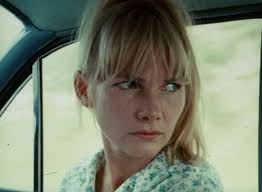STUDIO: Criterion | DIRECTOR: Barbara Loden | CAST: Barbara Loden, Michael Higgins, Dorothy Shupenes, Peter Shupenes, Jerome Thier, Marian Thier
RELEASE DATE: 3/19/19 | PRICE: DVD $22.69, Blu-ray $27.35
BONUSES: Documentary “I Am Wanda,” audio of Loden at the AFI in 1971, segment from The Dick Cavett Show, short “The Frontier Experience” directed by Loden
SPECS: PG | 103 min. | Drama | 1.37:1 widescreen | mono
Barbara Loden’s Wanda is a landmark 1970 independent film that received bigger accolades overseas upon its release than here in its country of origin. The film is a masterfully understated character study of a woman who, according to Loden, “needs somebody else to tell her what to do.” The last third, in which the lead gets involved in a spectacularly doomed bank heist, is so sunlit and downbeat that it qualifies as one of the most singularly innovative noir visions of the Seventies.
Until the bank heist part of the picture, the plot is as free-floating as its anti-heroine, Wanda (Loden). She has left her husband, feels no affinity for her kids and can’t find steady work. A chance meeting with a cranky and dictatorial but patently incompetent crook, Mr. Dennis (played by the wonderful character actor Michael Higgins), leads her to unwittingly, and very unwillingly, take part in a series of petty crimes — until Dennis dreams up the bank job.
As compelling as the film is, it becomes an even more impressive work when one learns of the conditions under which it was shot. Loden completed the script in 1962 and was shopping it around to star herself. When it became apparent that no one — including her husband, Elia Kazan (A Streetcar Named Desire) — could do justice to her notion of the script, Loden chose to make it herself on a shoestring budget with financial backing from one person (family friend Harry Shuster).
She had a three-man crew, shot in 16mm in Scranton and Carbondale, Pennsylvania; used natural light; and employed an almost entirely non-professional cast of local citizens. The result is a film that is indeed a “documentary” of fictional events and a work that has similarities with the work of John Cassavetes (Shadows, Faces) and Shirley Clarke, but is still very much sui generis.
As a drifter, Wanda is a hard character to get a bead on, initially. After a few scenes, it becomes apparent that she has no idea what she wants out of life, and the forceful men she meets dictate where she winds up — until she drifts into yet another dead-end situation. The film is a tremendous showcase for Loden’s talent (she appeared in only two films before Wanda — both of them made by Kazan — and did a larger amount of stage work). Higgins is quite impressive as a pushy and obnoxious crook whose best-laid plans are clearly doomed, but he’d never admit it.
The supplements in this package offer background on Loden and the film. She made two short films in addition to Wanda, and the one that she starrred in, “The Frontier Experience” (1975), is included here. It’s a rather staid, “educational” affair, set in 1869 Kansas, about a pioneer woman who has to fend for herself and her children when her husband suddenly dies. The short is scripted by Joan Micklin Silver (Chilly Scenes of Winter).
The most valuable supplement is a 1991 documentary on Loden shot in the last months of her life. She was struggling with breast cancer, unbeknownst to the filmmakers, and was trying to mount a new production of an O’Neill play. (She died in September 1980 at 48.)
Documentarians Katja Raganelli and Konrad Wickler cut between Loden working with her acting students and recounting her life story in detail to the camera. She cries when discussing a rift with her mother and speaks quite eloquently about the impulse to make certain that “people’s lives are not in vain.”
She also discusses the news story she read that provided the basis for Wanda and her own identification with the role. We hear from Kazan, who praises her acting ability and determination as an artist, and her main collaborator on the film, cinematographer Nicholas T. Proferes, who declares that he’ll “probably never make another film and have [as] much fun” as he did when filming Wanda.
An hour-long audio interview with Loden at the AFI doesn’t include any mention of the article that inspired the film, but it does include the brass tacks of the film’s production. Loden recounts how she raised the money to make the film and notes that the production itself was inexpensive ($115,000 in total) and postproduction costs exceeded her expectations (the film was shot in 16mm and blown up to 35mm).
Throughout the discussion Loden takes care to note that she didn’t initially consider herself a filmmaker but felt she was the only one who could film her screenplay properly. The most startling revelation is that she based the angry, dictatorial Mr. Dennis on none other than Elia Kazan.
The shortest supplement produces the most historical context for the time in which Wanda was released. Loden guested on The Dick Cavett Show in March 1971 to promote the film (following Howard Cosell and Jimmy Breslin). She tells Cavett that it wasn’t her gender that was a problem in making the film — her opinion was that it was “difficult for anyone” to get a film made.
Cavett gives some quality time to Wanda (including a chunky film clip) but he also discusses Loden’s career as an actress, mentioning one of her most curious credits, as a cast member on Ernie Kovacs’ mid-Fifties prime time network series, where she donned a gorilla suit to play one of the renowned Nairobi Trio.
|
Buy or Rent Wanda
|
|---|

Leave a Reply